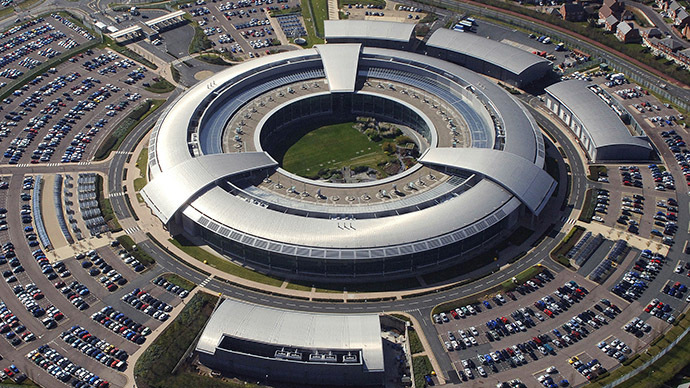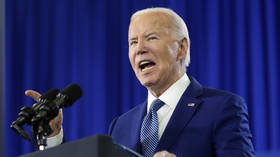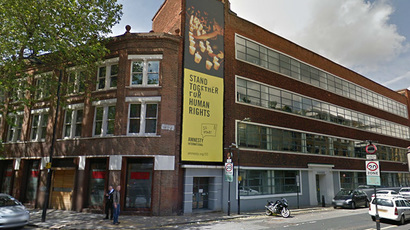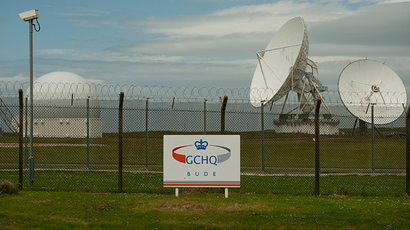#OpGCHQ: Anonymous launches 4-day privacy rights protest outside UK spy base

A four-day protest organized by the hacktivist collective Anonymous UK has begun outside Britain’s Government Communications Headquarters (GCHQ). The demonstration was launched in support of a legal challenge against GCHQ mass surveillance.
Anonymous has dubbed the protest ‘Operation GCHQ’, and is appealing to UK and international activists to attend the event. While a modest group of fifty to sixty campaigners had gathered outside the UK government’s listening post early on Friday evening, up to 9,000 are expected to attend the demonstration over the weekend. According to Anonymous UK, Saturday is set to be the main day of protest.
Anonymous is targeting the Cheltenham-based spy base to highlight grave concerns over an unwavering assault on Britons’ privacy rights in an increasing climate of mass surveillance. Privacy rights activists from France, Germany, Sweden and Ireland will attend the protest and join the collective in their call for a surveillance policy shift. Central to campaigners' demands, is the prioritization of citizens' right to privacy over the interests of security agencies.
#OpGCHQ#StopGCHQ Expect us! We are Legion! #Anonymouspic.twitter.com/qPqkiciPe3
— Lorax (@FibsFreitag) August 29, 2014
A spokesperson for Anonymous’ media team told RT on Friday UK authorities' insistence on spying on their own people with no legal justification was a primary motivation for holding the protest. “Innocent activists who have never broken any laws and act within the law are still targets of GCHQ and other spying agencies”, he said.
Although GCHQ attempted to liaise with Anonymous UK in advance of the four-day demonstration, a spokesperson for the collective who calls himself Ajacxuk said the group declined to respond.
“No correspondence is necessary. It’s our democratic right to protest. As long as the protest remains peaceful and respectful of GCHQ property there shouldn't be a need to justify activists’ motivation to defend their right to privacy”, he said.
While Anonymous UK acknowledge a degree of surveillance is required to protect Britain's national security, it cautions that current levels of GCHQ spying are unacceptable. Reflecting on the intrusive nature of GCHQ's surveillance techniques, Ajacxuk insists the intelligence agency possess an unhealthy degree of leverage - often manipulating the rule of law at will.
“Things need to change.This is beyond what’s reasonable - beyond legality", he argues.
We will also be broadcasting live from #OpGCHQ this weekend #ExpectUspic.twitter.com/4Rskm2XR1S
— AnonUK Radio_TV (@AnonUKRadio_TV) August 29, 2014
Ajacxuk, who runs the hacktivist collective’s radio station, insists Anonymous UK have been unjustly targeted by GCHQ on multiple occasions.“One of our servers was destroyed and our UK radio station has been shut down", he said on Friday, adding the group's site was also taken down following the launch of a campaign to feed homeless people throughout Britain.
Commenting on Anonymous' privacy concerns, another member of the hacktivist group told the BBC, “nobody wants to feel as though their every move is being watched, as though every bit of data is being collected."
The surveillance state: 'duplicitous and deeply wrong’
The legal proceedings which inspired the protest were launched by several civil liberty and human rights groups that question the legitimacy of UK intelligence agencies’ invasive practices. The case, brought by Liberty, Privacy International, Amnesty International, the American Civil Liberties Union and several other prominent international groups, focuses on grave concerns regarding a mass surveillance program called Tempora.
Documents leaked to the Guardian by whistleblower Edward Snowden allege the program facilitates UK intelligence officials' access to private email messages, information entered on social networking sites such as Facebook and telephone calls. While UK authorities have not denied the existence of this program, they are unwilling to comment on its operation.
We've been in the IPT today for our mass #surveillance claim against the Security Services. Here's our press release https://t.co/p6C3iEi30L
— Liberty (@libertyhq) July 14, 2014
Britain’s Investigatory Powers Tribunal (IPT) - a court which investigates complaints pertaining to the unlawful use of state practices that infringe on the public’s right to privacy - is currently seeking to ascertain whether Tempora exists. The IPT heard the case against the Secretaries of State in the Royal Courts of Justice in July. The proceedings, which were held in a public forum over five days, were initiated to discern if allegations derived from the Snowden leaks constituted a violation of Article 8 of the European Convention on Human Rights.
A final judgment was reserved, and the civil liberties groups who launched the proceedings are still awaiting an outcome. But Ajacxuk doesn’t believe the final judgement will favour the public’s right to privacy.“The government will carry on regardless. They will persist”,he suggests.
Reflecting on the case, Liberty's legal director James Welch said, “no-one suggests a completely unpoliced internet, but those in power cannot swap targeted investigations for endless monitoring of the entire globe."
In a BBC interview, UK actor and broadcaster Stephen Fry denounced UK authorities’ efforts to justify spying on their citizens on the basis of speculative threats to national security.
“The fear of terrorism that we all have, the fear of the unknown that we all share, the fear of enemies who hate us is a duplicitous and deeply wrong means of excusing something as base as spying on the citizens of your own country”, he argued.
Probed on whether Anonymous hacktivists have been targeted by British authorities under UK terrorism legislation, a spokesperson for the group declined to comment but emphasized hacktivists are regularly targeted internationally on these grounds.
Another member of the group said it’s quite likely many of those attending the protest over the weekend could be blacklisted and labelled by UK intelligence officials as “domestic terrorists”.














